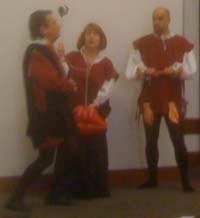About Les enfans sans abri
 Les enfans sans abri (LESA) is a non-profit medieval and early-modern performing group in Southern California. It has existed in one form or another since 1989. That year, its founder, actress and then-UCLA-Ph.D.-candidate Sharon King, grabbed the most talented-and medievally-inclined--people she could find at UCLA and began translating short late medieval and early Renaissance plays for them to perform. These were staged both for private groups and academic symposia. Over the years, the group, featuring an ever-changing assortment of talented actors, has done performances of farces, entremeses, sotties, allegories, comic monologues and dialogues, and parodic sermons, almost always in King's original (and usually rhymed) translations and adaptations. A few performances have offered vocal music from the 13th-17th centuries, and once or twice the group has performed or taught early modern dances....
Les enfans sans abri (LESA) is a non-profit medieval and early-modern performing group in Southern California. It has existed in one form or another since 1989. That year, its founder, actress and then-UCLA-Ph.D.-candidate Sharon King, grabbed the most talented-and medievally-inclined--people she could find at UCLA and began translating short late medieval and early Renaissance plays for them to perform. These were staged both for private groups and academic symposia. Over the years, the group, featuring an ever-changing assortment of talented actors, has done performances of farces, entremeses, sotties, allegories, comic monologues and dialogues, and parodic sermons, almost always in King's original (and usually rhymed) translations and adaptations. A few performances have offered vocal music from the 13th-17th centuries, and once or twice the group has performed or taught early modern dances....
 The group has been well received, allowing both academics and lay persons a glimpse into the comic mindset of 15th-17th-century Western Europe. The plays are performed in authentic and well-researched costumes and styles for the late medieval and early modern eras. They feature simple props and staging, in the way "portable" short comedies typically would have been brought before the public in these periods. The group's name is a (terrible) pun on "Les Enfants Sans Souci", the medieval French organization known for its performances of comic plays (especially sotties). Our ad-hoc theatrical group may or may not be "carefree", but we are indeed kids (at heart) "without shelter", with no playhouse to use as home base. Besides California, we've performed in New York, Arizona, Spain, and Germany. We've never even had a website until recently!
The group has been well received, allowing both academics and lay persons a glimpse into the comic mindset of 15th-17th-century Western Europe. The plays are performed in authentic and well-researched costumes and styles for the late medieval and early modern eras. They feature simple props and staging, in the way "portable" short comedies typically would have been brought before the public in these periods. The group's name is a (terrible) pun on "Les Enfants Sans Souci", the medieval French organization known for its performances of comic plays (especially sotties). Our ad-hoc theatrical group may or may not be "carefree", but we are indeed kids (at heart) "without shelter", with no playhouse to use as home base. Besides California, we've performed in New York, Arizona, Spain, and Germany. We've never even had a website until recently!
The plays are excellent mirrors of the popular concerns, trends, and issues of their time, and offer useful and humorous balance to other studies of these eras. The entertainments serve to remind us that human tastes in amusement and recreation have changed very little, even across five or more centuries.
We stage one to two productions per year and are constantly expanding our repertory. For more information, please contact the director of LESA.